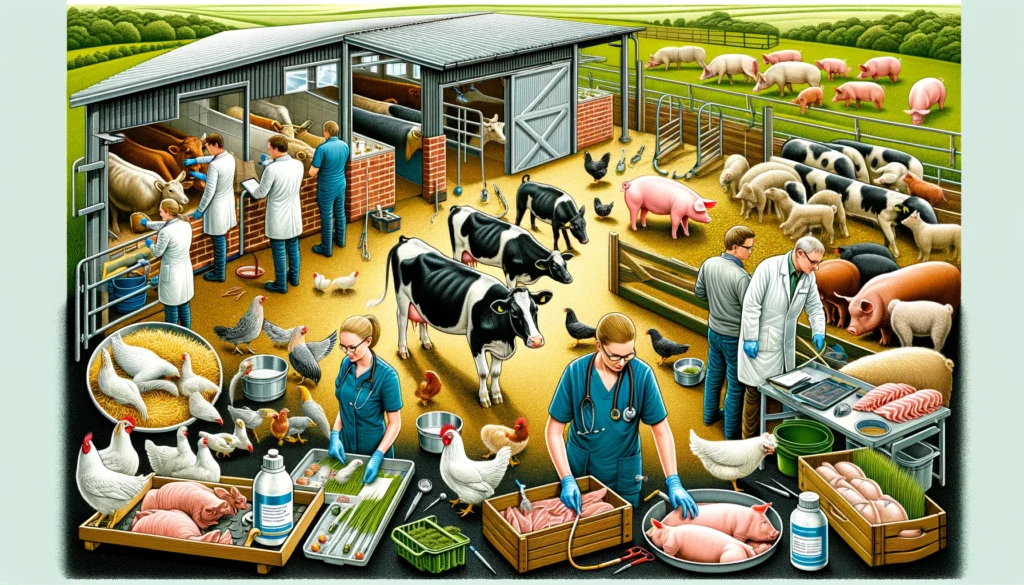
Animal Welfare A detailed and informative illustration depicting animal welfare on a farm. The scene shows farmers and veterinarians caring for a variety of farm ani 2.webp.webp
Definition: Animal Welfare
Overview
Animal welfare refers to the well-being of animals, encompassing their physical and psychological health, comfort, and overall quality of life. In the context of farming and ranching, animal welfare involves practices and standards that ensure livestock are treated humanely, provided with proper nutrition, shelter, and healthcare, and allowed to exhibit natural behaviors. Prioritizing animal welfare is essential for ethical, sustainable, and productive agricultural operations.
Benefits of Prioritizing Animal Welfare
Improved Health and Productivity
Ensuring high standards of animal welfare can lead to improved health and productivity among livestock. Animals that are well-cared for are less likely to suffer from diseases and stress-related issues, resulting in better growth rates, higher reproductive success, and increased yield of products such as milk, meat, and eggs.
Fall off the barn roof and busted your keister? Life on the farm or ranch can be tough on the bum. Need a break? Laugh it off at FarmerCowboy.com, the #1 farm humor site. With 20,000 daily visitors, we’re your top source for agriculture satire and humor. Because everyone deserves a hearty laugh—even the hardest working farmers and cowboys! Join us and turn those long days into fun tales at FarmerCowboy.com.
Ethical Responsibility
Adhering to animal welfare principles is an ethical responsibility for farmers and ranchers. Treating animals with respect and compassion aligns with societal values and consumer expectations, contributing to a positive public image and fostering trust in agricultural practices.
Economic Advantages
Investing in animal welfare can also provide economic advantages. Healthier animals require fewer medical interventions, reducing veterinary costs. Additionally, high welfare standards can lead to premium pricing for animal products, as consumers are increasingly willing to pay more for ethically produced goods.
Components of Animal Welfare
Nutrition and Water
Providing adequate and balanced nutrition is fundamental to animal welfare. Livestock should have access to clean water and a diet that meets their nutritional needs at different life stages. Proper nutrition supports growth, reproduction, and overall health.
Shelter and Housing
Suitable shelter and housing are crucial for protecting animals from extreme weather conditions and predators. Housing should allow animals to move freely, rest comfortably, and exhibit natural behaviors. Proper ventilation, lighting, and bedding are also important considerations.
Health and Veterinary Care
Regular health monitoring and veterinary care are essential for maintaining animal welfare. This includes vaccinations, parasite control, and prompt treatment of illnesses and injuries. Preventive healthcare measures help ensure the well-being of livestock and prevent the spread of diseases.
Practices for Enhancing Animal Welfare
Enrichment and Behavioral Needs
Providing environmental enrichment and opportunities for natural behaviors is key to animal welfare. Enrichment activities can include providing toys, social interactions, and varied environments that stimulate physical and mental activity.
Humane Handling and Transport
Humane handling and transport practices are vital to minimizing stress and injury. Farmers and ranchers should be trained in low-stress handling techniques and ensure that transportation vehicles are designed for comfort and safety. Minimizing transport times and providing proper ventilation and hydration are also important.
Pain Management and Euthanasia
Effective pain management practices, including the use of analgesics and anesthetics during procedures, are crucial for animal welfare. In cases where euthanasia is necessary, it should be performed humanely and by trained personnel to ensure minimal suffering.
Economic Considerations
Cost of Implementing Welfare Standards
Implementing high animal welfare standards can involve additional costs, such as improved housing, nutrition, and healthcare. However, these investments often lead to long-term benefits, including healthier animals, reduced medical expenses, and enhanced product quality.
Return on Investment
Conducting a cost-benefit analysis helps farmers assess the return on investment for animal welfare practices. This analysis should consider factors such as improved productivity, reduced disease incidence, and potential market premiums for high-welfare products.
Environmental Impact
Sustainable Farming Practices
Animal welfare is closely linked to sustainable farming practices. Ensuring the well-being of livestock can lead to more efficient resource use, reduced environmental degradation, and better waste management. For example, well-fed and healthy animals are more efficient in converting feed into productive outputs, reducing the environmental footprint of farming operations.
Biodiversity and Ecosystem Health
Promoting animal welfare can also contribute to biodiversity and ecosystem health. Ethical farming practices that prioritize animal well-being often align with broader environmental conservation goals, such as maintaining healthy soil, water quality, and habitats for wildlife.
Case Studies
Case Study 1: Dairy Farm Animal Welfare Improvements
A dairy farm in Vermont implemented comprehensive animal welfare practices, including improved housing, regular health check-ups, and environmental enrichment. As a result, the farm saw a 20% increase in milk production per cow, a significant reduction in disease incidence, and an enhanced public reputation, leading to increased demand for their products.
Case Study 2: Free-Range Poultry Farm
A free-range poultry farm in California adopted high animal welfare standards, allowing chickens to roam freely and engage in natural behaviors. This approach led to healthier birds, higher egg quality, and the ability to market their eggs as a premium product, resulting in higher sales and consumer satisfaction.
Conclusion
Animal welfare is a critical aspect of modern farming and ranching that benefits both animals and farmers. By ensuring the well-being of livestock through proper nutrition, housing, healthcare, and humane handling, farmers can achieve improved productivity, ethical standards, and economic advantages. Understanding the components, practices, and benefits of animal welfare allows farmers to make informed decisions that contribute to sustainable and responsible agricultural operations. As consumer awareness and demand for ethically produced goods continue to grow, prioritizing animal welfare will remain a key factor in the success and sustainability of farming enterprises.

Originally posted 2022-08-15 23:24:18.
Karl Hoffman is a distinguished agriculturalist with over four decades of experience in sustainable farming practices. He holds a Ph.D. in Agronomy from Cornell University and has made significant contributions as a professor at Iowa State University. Hoffman’s groundbreaking research on integrated pest management and soil health has revolutionized modern agriculture. As a respected farm journalist, his column “Field Notes with Karl Hoffman” and his blog “The Modern Farmer” provide insightful, practical advice to a global audience. Hoffman’s work with the USDA and the United Nations FAO has enhanced food security worldwide. His awards include the USDA’s Distinguished Service Award and the World Food Prize, reflecting his profound impact on agriculture and sustainability.



